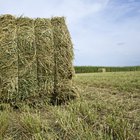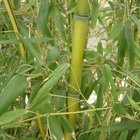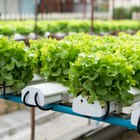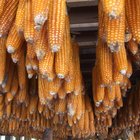
Genetic modification refers to the technology of combining genes of different organisms to create a genetically engineered or "transgenic" product. This technology is used to create vaccines, feeds and fibers, in addition to food and food ingredients. According to the U.S. Department of Energy's Genome Project website, 252 million acres of transgenic crops were planted in 22 countries by 10.3 million farmers in 2006.
Crops
One benefit of GM foods is the ability to increase higher crop yields due to built-in defenses against disease, pests and insecticides. GM foods are also designed with increased nutrients. For example, to help alleviate chronic malnutrition, Asian countries are planting genetically engineered rice crops that contain increased iron and vitamins.
Improved taste and quality are also benefits of genetic modification. In addition, scientists are working to create medicinal crops, such as bananas, that contain vaccination properties against such infectious diseases as hepatitis B.
Meat and Dairy
As with planted corn and soybeans, genetic engineering technology is used to create improved animal products. For example, cows can be created with a resistance to bovine illnesses such as mad cow disease. Yields of improved meat, eggs and milk are bi-products of this technology. The U.S. Department of Energy lists improved animal health and diagnostic methods, feed efficiency and hardiness as possible benefits of GM animals.
Environment and Society
Genetic modification also allows for production of bioherbicides and bioinsecticides that are considered environmentally friendly. Because of improved efficiency, GM foods may also conserve energy, soil and water. Other benefits include improved natural waste management and more efficient processing of crops. For society as a whole, GM technology may offer increased food security for non-industrialized nations with growing populations, according to the U.S. Department of Energy Office of Science.
Related Articles

The Disadvantages of Vermicompost

Processed Food Definition

How to Treat Anemia in Sheep

Quinoa Vs. Chicken

Can Age Spots Be Reversed?

Farm-to-Table Concept

What Foods Provide Calcium D-Glucarate?

What Is the Nutritional Value of Wheat?

Skin Care Products That Contain ...

What Additives Are in Flour?

Alfalfa Hay Nutrition Information

What Is the Durability of Bamboo Fabric?

Hydroponic Vegetable Nutrients Vs. ...

Difference Between Suede & Microfiber

Is Whole or Powdered Psyllium Better?

Staple Foods in Africa

The Difference Between Polartec and ...

Traditional Uses of Cuscuta

Slow Cookers & Nutrition

The Effects of Organic Fertilizer on ...
References
Writer Bio
Alison Stellner, owner of Body Tune Personal Training, is a fitness instructor and freelance writer with more than 25 years in the health and fitness industry. Her first professional article was published in "Idea Today Fitness Magazine" in 1993. She majored in music and business administration at the University of Oklahoma.
Photo Credits
Corn Fields image by Marvin Tejada from Fotolia.com